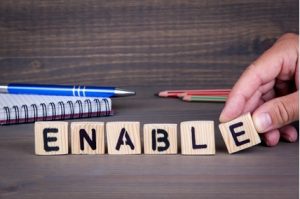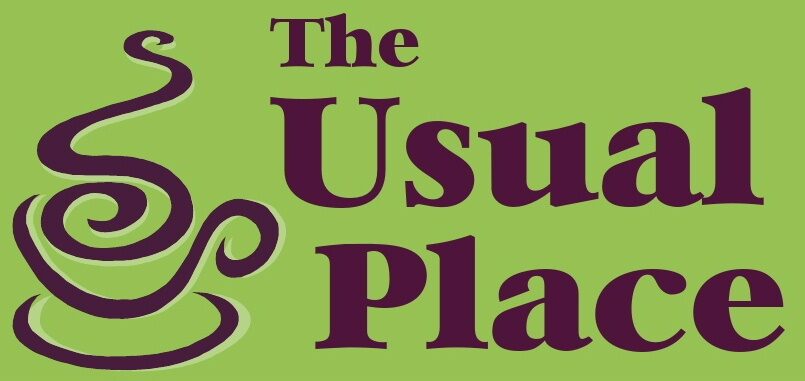Let’s Enable, Not Disable: An Occupational Therapist’s Perspective
Posted on: 18/10/2021, by : Craig McEwen
Sarah Geidesz, an Occupational Therapist for Children and Young People, spent some time at The Usual Place while still a student training to become a qualified Occupational Therapist.
This placement with us inspired Sarah into writing this very insightful blogpost into enablement, and she has asked us to share it with you all:
Let’s Enable not Disable
You might remember me as a self-care obsessed student harping on about ways to keep ourselves well over winter. Well, I’m back again, now as a qualified Occupational Therapist. I know can you believe!? I was very privileged to have been given a role within the children and young people’s service here in D&G. It’s been a busy few months since entering the post and although self-care remains just as important I wanted to share another subject that means a great deal to me and one that I hope after this blog may come to mean a great deal to you to.
That subject is enablement.
What is enablement?
By dictionary definition enablement means ‘the action of giving someone the authority or means to do something’. As someone who has worked within a caring profession for most of their life this definition got me thinking, do we as healthcare professionals truly give people the authority to do something? I can only speak for myself yet I know that I have often been guilty of ‘doing to’: to dress, to wash, to feed. If we consider an enablement approach ‘doing to’ forces people to become passengers within their own lives. Even with the best intentions it can be disempowering, limit choice and control and be further disabling.
Enablement accommodates individual need, challenge or disability and if embedded into practice can support children and young people’s development, learning and communication. By being enablers we can encourage children and young people to participate as fully as they can in their own lives and reach their full potential. The approach complements evidence that children’s health and wellbeing can impact their later life chances and experience. So if we enable from the get go we have the potential to broaden what opportunities they have access to across their lifetimes. To be able to influence better life outcomes is surely what it is all about!? I know for me being able to positively impact children and young people’s lives was the main reason I applied for this position and what better way to do this than through becoming an enabling practitioner.
Let’s talk real world
It may be evident through definition why enablement has become a passion of mine but if you’re anything like me you’ll prefer real world situations and this summer I got to experience just that.
As a student I had spent a placement within the service I currently work for. My placement educator was a very experienced therapist who had a real passion for enablement. She had done countless work to disseminate her knowledge across the region to empower parents and those in health and education to truly enable children and young people with disabilities. As part of this she had started an enablement group alongside a third sector organisation who run a cafe for young adults with disabilities. The group was created to give enablement opportunities to young people who were known to the service. As she left the service I was honoured yet daunted to have been trusted to carry this group forward.
This year’s enablement group ran for four sessions throughout the school summer holidays. Three children were identified to participate and were invited to attend. The sessions involved working in different parts of the cafe with some time for group reflection. Instantly within the first session the conversations they were having amongst each other were enough to warrant the group a success. One of the children who already attends high school was asked by another who was due to start about their experiences. This was a beautiful naturally occurring opportunity in which they were both able to explore their disabilities, share their anxieties and reassure each other.
By the second session, I quickly felt myself feeling a lesser need to be involved in the tasks required of them, to stand back and let them experience it for themselves. In doing so I could observe how they were truly participating, how they interacted with others and their true capabilities. As the third session came around their confidence and skill had notably grown. They were interacting well with other staff and customers; they were competent in the many tasks required of them and were able to reflect accurately on the skills they had acquired during each session. By the final group those who attended and their families were reporting significant changes in confidence, surprise at the true nature of the children’s abilities and were even requesting for further access to opportunities such as this.
Despite being passionate about enablement from the get go even I was surprised by what they were capable of achieving. In every minute of each session I was blown away by their determination, their adaptability and their willingness to get stuck in to a wide range of tasks. Many of which they had never had opportunity to participate in before, that were therefore completely unfamiliar to them. They were able to demonstrate an ability to overcome both physical and emotional hurdles and experience life as we all do. Through a web of trial and error, risk taking, exploration and mistake making. Experiences that we all encounter that enable us to learn, develop ourselves and find our place in the world.
A lifelong lesson
Running the enablement group was a significantly important learning curve for many, me being no exception. It taught me that even with the knowledge and passion in an approach that you can still hold assumptions and reservations about the capabilities of others and that often without knowing this can influence the decisions you make about what opportunities people have access to. It reiterated to me that you’ll never know until you try and that by not trying it may cause more harm than good. For these children not exposing them to such experiences is disabling, it denies them a wealth of opportunity, of discovery, of self- actualisation of a level of independence that will see them well into adulthood and enable them to live rewarding lives. This is why an enablement approach will fuel my way of working for the rest of my career and I hope that by reading this it too makes its way into your practice.
Sarah Geidesz
Occupational Therapist for Children and Young People
